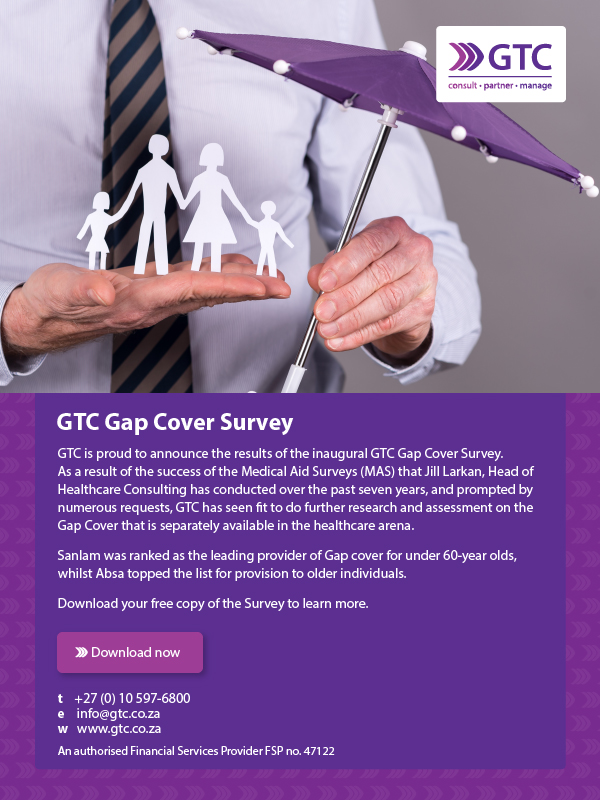|
To Subscribe please click
here |
 |
|
Investment Indicators - 28 May 2018 |
|
|
|
I believe life is an intelligent thing: that things aren't random
- Steve Jobs |
| |
|
|
Distributed to 52,071 subscribers.
To advertise with us
click here |
|
| |
 |
| Rates Review |
 |
|
1. Secured Investment Rates |
|
Please note that (G) indicates a Guaranteed and (L) a Linked product. In order to understand the difference between guaranteed and linked rates,
kindly click here for an explanation. |
|
|
|
|
|
 |
|
|
|
| |
Company |
This Week |
Last Week |
| 1 |
Clientéle Life (L) |
6.850% |
7.050% |
|
2 |
1Life (L) |
6.820% |
7.080% |
|
3 |
Absa (L) |
6.480% |
6.753% |
 |
|
|
|
|
|
|
|
|
 |
|
|
|
| |
Company |
This Week |
Last Week |
| 1 |
Discovery (G) |
7.014% |
7.083% |
|
2 |
Clientéle Life (L) |
6.950% |
7.150% |
|
3 |
Assupol (G) |
6.840% |
6.990% |
 |
|
|
|
|
|
2. Money Market Funds |
|
|
|
Please bear in mind that our figures, though based on the actual quotations that you also use, are for information purposes only,
and can never replace the official quotation from the product house. In terms of the guarantees, you are requested
to clarify the exact extent of such guarantees with the product house prior to advising clients. |
|
|
|
|
|
 |
|
From the Crow's Nest |
 |
Tax update for Saffers working overseas
Tony de
Wijn, Softbyte Computers |
Many skilled South Africans have accepted employment opportunities in
foreign countries for lengthy periods such as for most of the year
or even for several years continuously, and so legally avoided
paying tax in South Africa. SARS has, in the past, treated these
people as “non SA residents for taxpaying purposes”. In other
words these people were still SA citizens but not liable for income
tax in SA.
SA adopted a “residency-based” income-tax system on 1st March 2001
and this basically means that persons pay income tax in the country
where they live and work for most of the year. If a SA citizen lives
and works in a foreign country with a DTA (Dual Taxation Agreement),
such as the UK for example, for most of the year, then they should
be treated as a UK taxpayer and pay income tax in the UK. This also
means that if they spend most of the year living and working in a
country where there is no income tax, such as Saudi Arabia for
example, then they pay no income tax in Saudi Arabia and no tax in
SA, so they pay no income tax at all.
SARS has now changed the tax laws in SA (Taxation Laws Amendment
Bill Dec 2017) and SA citizens working overseas will now pay income
tax on a portion of their offshore earnings to SARS. This is now
law and the law will come into effect on 1st March 2020
which gives those affected time to arrange their working schedules.
If there is a DTA in place, the first R1m of salary/income earned
offshore will be exempt from tax and SARS’s normal tax rates will
apply to the balance of income earned. This means that, if a person
earns R1.1 million in foreign salary/income then the first R1m will
be exempt from tax in SA and SARS will tax them at 18% on the
R100 000 balance.
There is no distinction between salary/income earned in foreign
countries where tax is deducted and foreign countries where no tax
is deducted. This means that if R1.1m salary was earned offshore and
R300K tax was deducted offshore then SARS would say that R300K in
tax was deducted offshore on what SARS sees as R100K income (because
R1m is exempt). In terms of s6quat* and using current tax
rates, SARS would say that, only R18K should have been deducted
offshore so you can only claim R18K of the R300K taxes deducted
offshore on your tax return as allowable taxes already paid. Many
people working in foreign countries enjoy fringe benefits such as
accommodation, the occasional free flights home etcetera, as part of
their contracts, and SARS sees all these benefits as part of taxable
foreign earnings. If a SA citizen works in Saudi Arabia for a year
and earns R2m then no income tax is deducted in Saudi Arabia. SARS
will exempt R1m of the income and SARS will levy over R300 000 in
income-tax on the R1m balance of the foreign income earned (using
the current 2019 tax tables).
The only way to avoid this situation is for the taxpayer to emigrate
financially. Merely re-locating to a foreign country for a time and
keeping your SA passport is not good enough. We all live in the same
“global village” where everything is interconnected. SARS assured us
many times that financial institutions all over the world are linked
to tax regimes in all countries and SARS will find you unless you
have officially emigrated. If you have a bank account opened in a
foreign country using your SA passport then SARS will have access to
that bank account’s transaction records. Tax regimes around the
world work together. SA banks have to provide Revenue Canada, for
example, with transaction records of accounts in SA held by Canadian
passport holders.
Because this new law only comes into effect on 1st March 2020,
there is still a small chance that minor amendments could be made
before then but tax practitioners and financial consultants should
advise their clients accordingly if this new law applies to any of
their clients.
* S6quat limit
Where SA citizens work offshore for less than the period-limits
mentioned then they have to declare the foreign income, and any
taxes deducted in the foreign country, on their local IRP5 tax
return. They will be taxed on the foreign income earned but a
special formula will dictate how much of any tax deducted by the
foreign country may be claimed, on their local assessment, as taxes
already paid. This limit of taxes deducted offshore that they may
claim as a tax credit is called your “s6quat” limit.
What this means is that, if a taxpayer earned R100,000 working in
SA, then SARS’s tax tables show a tax due of R18 000 (before the
primary rebate). If a SA citizen worked in a foreign country earning
R100 000 and R20 000 PAYE was deducted in the foreign country, then
SARS would only allow them to claim R18,000 on their assessment as
taxes already paid. SARS will not credit you with the R2 000 “excess
tax” deducted in the foreign country. SARS only allows you to claim
the amount of tax that would have been deducted here in SA had the
income been earned here in SA.
Click here to download the pdf version to share with your clients |
|
|
|
|
|
 |
|
|
| Your Practice Made Perfect |
 |
|
Moonstone Compliance Workshops – Port Elizabeth and East London last
chance to register! |
Bloemfontein responded splendidly to last week’s challenge,
requiring us to arrange extra seats. Port Elizabeth and East
London have until Wednesday to register, with just over 50%
occupancy thus far. Come on guys, help us to help you.
Remember: You can earn 3 FSCA Fit and Proper CPD hours by attending.
FPI members can, in addition, also qualify for 3 FPI Ethics and
Practice Standard CPD points towards their professional designation CPD
requirement. Members who know how scarce such opportunities are will
certainly make use of this double whammy.
Identification required: Please note that identification steps
must be implemented to ensure the validity of your CPD claim. It is very
important that you bring your valid driver’s licence or acceptable
identification document to the workshop.
The workshops will cover the Insurance Regulations, Policyholder
Protection Rules, the new Debarment process, the Financial Sector
Regulation Act, proposed changes to the General Code of Conduct and an
in-depth unpacking of the 12 elements of the New Fit and Proper
Requirements.
Staying abreast of these developments is crucial to your survival in the
industry, so please make sure you do not miss out on the most
informative workshop you will be able to attend this year.
Book your seat – register today to avoid missing out. |
|
|
|
|
|
 |
| |
|
A tough first quarter for local collective investment schemes
|
The Association for Savings and Investment South Africa (ASISA reported
that the local Collective Investment Schemes (CIS) industry reported a
3.2% drop in assets under management for the first quarter of this year
as a result of difficult market conditions and subdued net inflows on
the back of bruised investor sentiment.
According to the CIS industry statistics for the quarter and year ended
March 2018, released by ASISA, asset under management dropped to
R2.18 trillion over the first quarter of this year from R2.25 trillion
at the end of December 2017.
Sunette Mulder, senior policy adviser at ASISA, says not only did the
JSE All Share Index (ALSI) report a drop of 6% in the first quarter of
this year contributing to lower assets under management, but the
industry also attracted quarterly net inflows of only R3 billion to the
end of March 2018.
Click here to read and download the media release. |
|
|
|
| |
 |
| |
|
The 10 biggest unit trusts in South Africa |
The Business Insider has also compiled a list of the 10 biggest South African
unit trusts in the first quarter of 2018 based on the statistics release by ASISA. According to the statistics some R1.9 trillion is invested in SA unit
trusts, down 3% from the last quarter. Unit trusts from Coronation, which was
one of the biggest investors in Steinhoff, continued to feature in the top 10.
Click here to view the top 10 list. |
|
|
|
| |
|
Publication of 2018 Compliance Reports delayed – FSCA
|
The FSCA has released a communication that the 2018 Compliance
Reports will be published in June 2018.
As a result of the delay in the publication, the submission date for
the Category I FSP with Compliance Officer report will be extended.
Further notification advising of the publication of the 2018
Compliance Reports will be sent in due course.
|
|
|
|
|
Regulatory Examinations |
 |
|
RE Deadline 30 June 2018 |
The table below indicates who has to successfully complete the
Regulatory Exams by 30 June 2018.
|
Representatives’ DOFA |
RE 5 Deadline |
|
30/06/2015 – 31/12/2015 |
30/06/2018 |
|
01/01/2016 – 29/06/2016 |
30/06/2018 |
|
30/06/2016 – 31/12/2016 |
30/06/2019 |
DOFA refers to your date of first appointment. For instance,
if you were appointed on 1 September 2015, you actually have
two years and nine months in which to pass the RE 5 for
representatives.
Unfortunately, time is now running out for those who are
compelled to pass in less than one month.
-
Remember that bookings close about two weeks before the
actual exam, for logistical reasons.
-
In order to write before the DOFA deadline (last exam in
June on the 29th), candidates should register by 14 June 2018.
-
IMPORTANT: It is the responsibility of the candidate to
make sure that he/she is registered for the correct
examination, date, time and venue.
|
|
|
|
| |
|
How to prepare for the REs |
The FSCA strongly recommends the use of its
Preparation Guide to prepare for the exams. As you are aware Inseta
has advised that its study material contains errata. We therefore
recommend that this is only used for easier understanding of the
knowledge required, while the FSCA Preparation Guide and related
legislation should be the basis for learning.
The FSCA Preparation Guide recommends the following approach
|
STEP |
ACTIVITY |
DESCRIPTION |
|
1 |
Refer to the
mapping document for the exam you are planning
to write. |
This is the map of
the tasks/criteria that will be assessed in your
exam, and it contains a reference to the
relevant legislation that you are required to
study in order to understand the task /
criteria. Appendix A in the Preparation Guide |
|
2 |
Look at the number
of criteria for each task. |
These are the
knowledge and skill components you require to be
able to perform.
RE 1 has 16 tasks that will be tested
RE 5 has 8 tasks that will be tested
If you have studied all the criteria for every
task, then you would be properly prepared to
write the RE 1 or RE 5 – whichever exam applies to
you. |
|
3 |
To prepare for the
exam, you must spend time each day and study the
legislation and supporting training material.
One should systematically select one criteria at
a time. |
Group the criteria
together in groups of 3 or 4 and allocate study
hours per day to prepare. The total number of
hours will individually differ due to ones
circumstances. At least 2 hours per day is the
suggested number of hours. |
|
4 |
To start, read the
task, and then the first criteria. Then refer to
the legislation for these criteria, and read the
legislation referred to. |
It is important to
first read the legislation so that you can see
what terms are used and how the legislation is
structured. |
|
5 |
Now refer to the
additional support or training material and study
the section in the training material dealing
with those particular criteria. |
The support
material explains the particular concepts in
simple language so that it is easier to
understand what the legislation is actually
saying and what it means. |
|
6 |
Then go back to the
legislation itself, and read it again.
NB The
questions are based on the actual legislation,
NOT external training material. |
Now that you have
gained a better understanding of what the
legislation is about, you may find reading the
legislation again will make more sense to you if
you didn’t understand it the first time around. |
An alternative that you may want to consider is the
LexisNexis Legislation Handbook for RE 1 (key individual)
and RE 5 (representative) exams.
The 5th edition of the Handbook has just been
released and provides the latest legislation specified as
relevant to the regulatory exams RE 1 and 5.
The Handbook has been divided into 5 sections with shaded
tabs on the side for easy access:
-
TAB A: FAIS Act and Regulations
-
TAB B: Code of Conduct
-
TAB C: Fit and Proper
-
TAB D: General Acts, Board Notices and Guidance Notes
-
TAB E: FIC Act, Regulations and Guidance Notes
The Handbook together with its Preparation Guides provides a
good source to study for the exams. Click here to download
the LexisNexis Preparation Guide for
RE 1 and
RE 5.
Click here to order the updated LexisNexis
Legislation Handbook from our Advisor Store. |
|
|
|
| |
|
2018 Schedules updated |
Please note: Registration cut-off is 11 working days before date of exam.
|
|
|
|
|
Careers Platform
|
|
Are you hiring? Advertise your position on Moonstone’s Career Platform
|

| • |
The Moonstone website -
www.moonstone.co.za
- enjoys an average of 20 000 visits and approximately 39 000 page views per month. |
| • |
Moonstone boasts an exclusive newsletter mailing list of over 51000
dedicated financial decision makers who receive 2 newsletters per week. |
| • |
Our audience is relevant and industry specific: individual and corporate advisors and brokers in the following financial sectors:
iInvestment, Risk, Healthcare, Banking, Retirement, and Insurance. |
|
|
|
|
| |
|
Featured Positions |
-
2 x Marketing
Assistants:
HIC Underwriting Managers Pty Ltd, Bedfordview - We are looking for
two assistants to manage the relationship between the Portfolio Manager
and Broker. Must be able to work under pressure and be deadline driven.
Read More
-
Claims Administrator:
Cooke Fuller Garrun, Kloof, KZN - The ideal candidate should have at
least 5 years experience in Commercial and Personal claims and must be
FAIS qualified.
Read More
-
Para-Planner:
Carrick Wealth, Johannesburg, Durban and Cape Town - The
Para-planner will be responsible for researching and analysing products
to present recommendations to clients based on a thorough financial
planning process.
Read More
-
Financial Advisor:
Universal Life Brokers, Randburg - Candidates must have at least 5
years experience in the long term insurance industry and in possession
of a NQF5 qualification in financial planning.
Read More
-
Experienced Financial
Advisers:
Centered Financial Solutions Pretoria / Centurion - Top franchise
with the most comprehensive product range that included risk,
investment, RA, short term & medical aid looking for dynamic financial
advisers.
Read More
|
|
|
|
|
In Lighter Wyn |
 |
|
It’s a dog’s day … |
What do you get when you try to cross a pit bull with a computer?
A lot of bites.
What do you call a sleeping Rottweiler?
Anything you like, just very quietly.
Upon entering the little country store, the stranger noticed a sign
saying “DANGER! BEWARE OF DOG!” posted on the glass door.
Inside he noticed a harmless old hound dog asleep on the floor
beside the cash register.
He asked the store manager, “Is that the dog folks are supposed to
beware of?”
“Yep, that’s him,” he replied. The stranger couldn’t help but be
amused. “That certainly doesn’t look like a dangerous dog to me. Why
in the world would you post that sign?”
“Because”, the owner replied, “before I posted that sign, people
kept tripping over him.”

|
|
|
|
|

Tel: +27 21 883 8000 | Fax: +27 21 883 8005
info@moonstoneinfo.com
www.moonstone.co.za
P.O. Box 12662, Die Boord, Stellenbosch, 7613, Republic of South Africa
Disclaimer:
Services and products advertised by external product suppliers in
this newsletter are paid for by the respective suppliers. Moonstone
does not endorse any opinions, conclusions, data, products, services
or other information contained in this e-mail which is unrelated to
the official business of Moonstone and furthermore accepts no
liability in respect of the unauthorised use of its e-mail facility
or the sending of e-mail communications for other than strictly
business purposes.
The complete disclaimer can be accessed
here. |
|
|
©2015 Moonstone. All rights reserved. |
| |


















